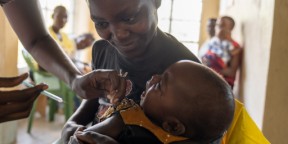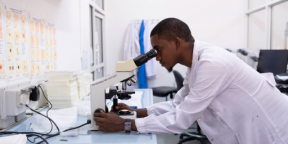COVID-19 strengthens the British public's desire to fight global diseases
Reported in the Telegraph on Thursday 29 October, 2020
- 88% think an investment in global disease prevention is an investment in our national security.
- 79% of people want the UK to invest in science and innovation to combat malaria
- More than half of people said their view on the importance of preventing global disease has grown in the last year.
- As the UK Government reviews state spending, Malaria No More UK calls for a renewed financial commitment to ending malaria.
Our new polling has discovered Covid-19 has strengthened the British public’s awareness of global disease, and desire to fight it. More than half of people said their view on the importance of preventing global disease has grown in the last year. Of these people, almost all of them (98%) said that was because of Covid-19.The British public view disease prevention – both at home and aboard – as an issue of national security, with over four-fifths (88%) of people agreeing that an investment in disease prevention is important to the UK’s security. This sentiment strengthens with age, seeing 90% of 50+ agreeing strongly versus 66% of 18-24.
This strong display of public support comes at a time when the UK Government is undertaking a spending review of all departments including that of the newly formed Foreign and Commonwealth Development Office. The FCDO will now lead global health security investment, including on malaria.
The UK Government has been a critical leader in the fight to end malaria both financially and through the contribution of science, innovation and political leadership. Now, as the Chancellor comes to review government spending, we urge them – in unison with public sentiment - to remember the importance of fighting deadly disease globally and renew its financial commitment to ending malaria for good.

Nearly three quarters (74%) of people agreed that the UK is more effective in preventing disease globally when it works with other countries. This view applied to the majority of both remain (87%) and leave (66%) voters, Conservative (68%) and Labour (82%).
The public agrees that the UK should invest in science and innovation to combat deadly disease with over three quarters (79%) of people wanting the UK to invest in science and innovation to combat malaria.
The Government must continue its strong track record of fighting malaria and keep saving lives.
- In 2016, the UK Government made a five-year commitment to contribute £500m per year towards malaria efforts.
- In 2018, at a Commonwealth Heads of Government Meeting in London, the Government led the Commonwealth to commit to halving malaria by 2023.
- In 2019, the Conservative Party included a commitment to lead the way in eradicating malaria within its Election Manifesto.
The global malaria death rate fell by 62% between 2000 and 2015. But progress towards ending malaria has stalled. In April, WHO and Imperial College London modelling predicted that malaria deaths in sub-Saharan Africa could double in 2020 if access to life-saving insecticide-treated nets and antimalarial treatment is disrupted by Covid-19.
While many countries, governments and partners are moving ahead with essential anti-malaria programmes, the full impact of COVID-19 on malaria responses may not be known for some time. Even with the remarkable actions taken by countries, malaria cases and mortality are expected to rise.
We know how to prevent, track and treat malaria, but the strain Covid-19 puts on health systems risks hard fought for progress. Protecting people against Covid-19 cannot be pursued in isolation. Governments must see maintaining efforts against malaria as a core part of pandemic preparedness or risk a catastrophic domino effect.





